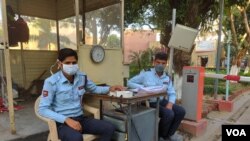India has virtually shut itself off from the world in an effort to contain the spread of coronavirus as it suspended entry for foreign nationals for a month, except for those from a handful of categories.
"India quarantines itself," screamed newspaper headlines as the government announced that foreigners would be barred starting Friday.
The step to isolate the country is being called a “nuclear response” to the deadly infection that has been declared a pandemic by the World Health Organization.
The far-reaching measure came amid rising worries that if coronavirus cases flare in India, it would be hard to control its spread in a country of 1.3 billion people where, at the best of times, the public health system is overstretched in teeming cities and virtually nonexistent in vast rural areas.
"India has been focused on preventive approach," Sanjeeva Kumar, special secretary at the Health Ministry told reporters Thursday. “Our primary focus," he said, "is that we collectively take this battle forward so that people do not end up suffering at large.”
The latest count of 73 confirmed cases is still small compared with the much higher number in many countries, but that number has risen rapidly and more than doubled in the last four days. More worryingly, they have been reported from 12 states stretching from the north to south.
"The attempt at the moment is to try and prevent it from becoming a widespread community infection and halt the entry of the virus into the country beyond what has already happened,” according to Dr K. Srinath Reddy, president of the Public Health Foundation of India. “The idea at the moment is containment,” he said.
The restrictions effectively mean that no foreign tourists can enter India until April 15. Only travelers with diplomatic, U.N., official, and employment visas are exempt.
The government has also "strongly advised" Indians against nonessential foreign travel, warning that they can be subject to quarantine for at least two weeks.
India also closed its land border with neighboring Myanmar and stepped up surveillance in its eastern states that border Nepal.
The government has assured people that it is equipped to handle the coronavirus crisis. The number of laboratories has been increased from 15 to 52. In the southern state of Kerala, where the most cases have been identified, schools and movie theaters have been closed.
In the cricket-obsessed country, cricket matches are also likely to be played to empty stadiums as the government advised against any event that involves a large crowd.
Public health experts warn, though, that all this could fall short and the world’s second most populous country will be overwhelmed if it faces a huge spike in cases.
Besides its sheer numbers, India’s challenge is also its high population density - 420 people live on each square kilometer compared with about 150 in China. A massive migrant population in a country where people are always on the move between villages and cities would make it easy for the virus to spread. India is unlikely to be able to shut down an entire region, as China did. Of particular worry are underdeveloped states like Uttar Pradesh and Bihar, which could become the source of widespread infection.
"The health system has not been prepared for this kind of problem,” Reddy said. There is only one hospital bed per roughly 1,800 people in the country and one state hospital per more than 55,000.
He said the coronavirus should serve as a warning to India to ramp up expenditure on health.
"We cannot take our capacity to deal with such problems for granted and suddenly wake up to the unpleasant reality that we are falling far short of what is required. Some of the previous neglect of our public health system needs to be quickly addressed,” he said.

